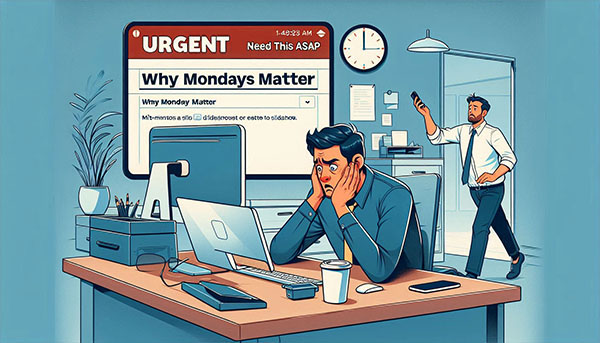By: John S. Morlu II, CPA
Welcome to the wild and wacky world of small business, a place where chaos meets creativity, and every day feels like an episode of “Survivor: Office Edition.” Here, employees and owners alike are thrust into a never-ending circus act, juggling tasks with the grace of a clumsy clown, jumping through hoops of deadlines, and occasionally trying to tame the ferocious beast known as “The Printer”—a creature that seems to have a mind of its own, always choosing the most inconvenient moment to jam, malfunction, or simply refuse to print in black and white.
In this unpredictable environment, the roles of employees and owners can often feel as absurd as a carnival sideshow, with everyone scrambling to keep the plates spinning while dodging the inevitable curveballs that come flying out of nowhere. Whether it’s the spontaneous “emergency” meetings that could have been emails or the never-ending quest to find that one file everyone swears they saved, the small business world is a place where logic takes a backseat and improvisation reigns supreme.
But fear not! Amidst the madness, there is wisdom to be found, even if it comes from a surprising source: the ancient verses of Ephesians 6:5-9. These timeless words, originally intended to guide the relationships between masters and servants, provide a strangely fitting lens through which to view the modern-day dynamics between small business owners and their employees. With a little creative interpretation and a lot of humor, we can uncover the hidden truths about our daily grind and maybe even have a good laugh along the way.
This satirical guide is here to take you on a hilarious journey through the ups and downs of small business life, where the responsibilities and rights of both employees and owners are laid bare in all their ridiculous glory. Expect plenty of examples that hit close to home, a healthy dose of sarcasm, and a few moments of “Oh, that’s so true!” along the way. So buckle up—it’s going to be a bumpy ride through the circus tent of small business, where the clowns are running the show, and the audience is always in for a surprise!
Employees: The Obedient (and Slightly Cynical) Heroes

Verse 5: “Servants, be obedient to them that are your masters according to the flesh, with fear and trembling, in singleness of your heart, as unto Christ.”
Translation: “Employees, do whatever your boss says, even if it makes as much sense as wearing socks with sandals.”
Ah, the life of an employee in a small business—where “obedient” often means taking on tasks that range from the mildly inconvenient to the downright ridiculous. Take the “Emergency Paperclip Sorting” operation, for example. Your boss, in a moment of sheer panic, decides that all the paperclips in the office must be organized by size and color. Why? Because, clearly, the success of the entire company hinges on this critical task.
And so, with fear and trembling (and a slight eye roll), you set to work. Because deep down, you know that your job is not just about fulfilling your duties—it’s about keeping the boss’s delusions of grandeur in check.

Verse 6: “Not with eyeservice, as menpleasers; but as the servants of Christ, doing the will of God from the heart.”
Translation: “Don’t just pretend to work—actually work, even if you’re secretly daydreaming about winning the lottery.”
We’ve all encountered the legendary “eyeservice” employee. This is the person who can spend an entire workday looking incredibly busy while doing absolutely nothing. Their secret weapon? The strategic placement of spreadsheets, open tabs, and a furrowed brow that suggests they’re deep in thought. In reality, they’re planning their weekend getaway or perfecting their Angry Birds high score.
But let’s not be too harsh—after all, the boss rarely notices. Why? Because they’re too busy doing their own version of “eyeservice,” which usually involves making phone calls that go straight to voicemail and sending emails with the subject line “URGENT” in all caps.

Verse 7: “With good will doing service, as to the Lord, and not to men.”
Translation: “Smile while you work, even if the task is as pointless as a chocolate teapot.”
Picture this: It’s Monday morning, and the boss has just informed you that the office needs a complete reorganization. Every desk, chair, and potted plant must be rearranged to “boost productivity.” Never mind that it’s the third time this year, or that the boss’s idea of productivity involves watching TED Talks on “How to Inspire Your Team.”
As an employee, you dutifully comply, moving furniture around like a game of Tetris, all while keeping that customer service smile firmly in place. Because, as the verse says, you’re doing this for a higher purpose—namely, ensuring the boss doesn’t have another existential crisis.

Verse 8: “Knowing that whatsoever good thing any man doeth, the same shall he receive of the Lord, whether he be bond or free.”
Translation: “Good deeds are like boomerangs—they might come back to you, but probably when you least expect it, like at your next job interview.”
In the small business world, karma is a funny thing. You might spend hours fixing the copier that everyone else in the office mysteriously forgot how to use. Or perhaps you stayed late to finish a project because your colleague claimed to have “a doctor’s appointment,” which suspiciously coincided with the season finale of their favorite TV show.
But don’t despair—your good deeds don’t go unnoticed. Well, they do, but in some cosmic, karmic way, they’re being tallied up. So when you’re finally rewarded with that extra day off (five years from now), you can rest assured that your dedication has not been in vain. Or at least that’s what you’ll tell yourself as you browse job listings during your lunch break.

Owners: The Benevolent (and Occasionally Oblivious) Overlords
Verse 9: “And, ye masters, do the same things unto them, forbearing threatening: knowing that your Master also is in heaven; neither is there respect of persons with him.”
Translation: “Hey bosses, treat your employees like humans, not like sentient office furniture.”
Dear small business owners, we need to talk. You’re the captains of this ship, steering it through the stormy seas of commerce. But sometimes, you might forget that your crew is made up of actual people—not just cogs in your grand entrepreneurial machine.
Forbearing threatening doesn’t just mean avoiding phrases like “You’re replaceable,” or “If you can’t handle this, maybe someone else can.” It also means refraining from the passive-aggressive Post-it notes that mysteriously appear on the office fridge, reminding everyone that “The kitchen is everyone’s responsibility.” (Translation: “Clean up your mess, or else!”)
And let’s not forget the golden rule: your success depends on how you treat your employees. If your leadership style involves randomly assigning tasks like “revamping the entire company website by tomorrow,” you might want to reconsider. After all, even the most loyal employee has a breaking point—and it’s usually somewhere between “mandatory weekend workshop” and “surprise 7 AM conference call.”
Real-World Scenarios: When Employees and Owners Collide
Now that we’ve laid the groundwork, let’s dive into some real-world scenarios where the employee-owner relationship plays out in all its ridiculous glory.

Scenario 1: The “Mission-Critical” Email
It’s 4:55 PM on a Friday, and just as you’re about to shut down your computer, you hear that dreaded ding! An email from the boss with the subject line “URGENT: NEED THIS ASAP.” Your heart sinks as you open it, only to find that the “mission-critical” task is…creating a slideshow for Monday’s team meeting. The topic? “Why Mondays Matter.”
As an employee, you stare at the screen, wondering if this is some kind of cruel joke. Meanwhile, the boss is already halfway out the door, fully expecting the slideshow to be ready and complete with inspirational quotes by Monday morning.
But don’t worry—the boss is confident that this task will “bring the team closer together.” Because nothing says teamwork like slapping together a last-minute PowerPoint presentation while everyone else is already at happy hour.

Scenario 2: The Office Birthday Extravaganza
In the world of small business, every employee’s birthday is a chance for the boss to show how much they “care” about the team. This usually involves a surprise party in the break room, complete with stale cake, a half-hearted rendition of “Happy Birthday,” and a speech from the boss that goes something like this: “We’re like a family here. And just like in any family, we sometimes have to work late and skip lunch, but it’s all worth it in the end, right?”
As an employee, you know the drill. You show up, smile, and eat the cake—even if it tastes like it was left over from the last office celebration. Meanwhile, the boss beams with pride, blissfully unaware that everyone is already planning how to make a swift exit once the candles are blown out.

Scenario 3: The Annual “How Are We Doing?” Review
The annual performance review is the ultimate exercise in workplace absurdity. The boss summons you to their office, where you’re greeted with a document that’s longer than War and Peace. It’s filled with buzzwords like “synergy,” “core competencies,” and “opportunities for growth”—all of which translate to “Here’s more work for you with the same pay.”
As the boss drones on about your “areas for improvement” (most of which involve things you didn’t even know were part of your job), you nod and smile, secretly wondering if this is some sort of elaborate prank. The highlight of the review? When the boss asks you to set “stretch goals” for the next year—because clearly, what you need is more impossible targets to hit.
And so, the review ends with a handshake and a vague promise of “continued success.” You leave the office with a new list of goals, none of which you intend to think about until next year’s review.

The Rights and Wrongs of It All: Balancing the Scales
In the end, the small business circus is all about balance. Employees have the right to a fair wage, respect, and a clear job description that doesn’t include “whatever the boss feels like today.” Owners have the right to expect dedication, hard work, and the occasional bout of enthusiasm—especially during those mandatory team-building exercises.
But with rights come responsibilities. Employees need to bring their A-game, even when the tasks are as pointless as rearranging the office plants for the fifth time. Owners need to remember that their team is made up of actual people with lives, feelings, and a limit to how many “URGENT” emails they can handle before they start questioning their life choices.

Conclusion
So, what have we learned from this satirical exploration of small business life? That working in a small business is like participating in a never-ending game of charades, where everyone pretends to know what they’re doing, and the rules change every five minutes.
But here’s the kicker: despite the chaos, the frustration, and the occasional absurdity, there’s something uniquely rewarding about being part of a small business. It’s a place where you can make a difference, build meaningful relationships, and maybe, just maybe, find a sense of purpose in the daily grind.
And if all else fails, there’s always cake in the break room—just don’t ask how long it’s been there.
Author: John S. Morlu II, CPA is the CEO and Chief Strategist of JS Morlu, leads a globally recognized public accounting and management consultancy firm. Under his visionary leadership, JS Morlu has become a pioneer in developing cutting-edge technologies across B2B, B2C, P2P, and B2G verticals. The firm’s groundbreaking innovations include AI-powered reconciliation software (ReckSoft.com) and advanced cloud accounting solutions (FinovatePro.com), setting new industry standards for efficiency, accuracy, and technological excellence.
JS Morlu LLC is a top-tier accounting firm based in Woodbridge, Virginia, with a team of highly experienced and qualified CPAs and business advisors. We are dedicated to providing comprehensive accounting, tax, and business advisory services to clients throughout the Washington, D.C. Metro Area and the surrounding regions. With over a decade of experience, we have cultivated a deep understanding of our clients’ needs and aspirations. We recognize that our clients seek more than just value-added accounting services; they seek a trusted partner who can guide them towards achieving their business goals and personal financial well-being.
Talk to us || What our clients says about us



